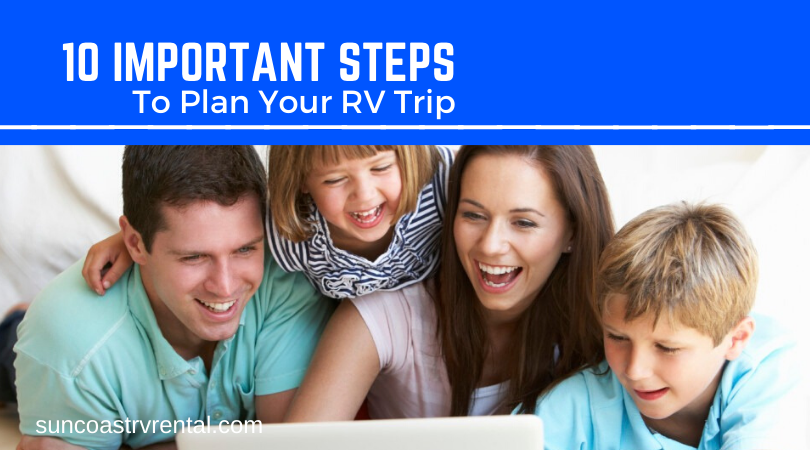Nine out of 10 current RV owners think that RVing is the best way to travel as a family, according to research by Louis Harris and Associates. And, for good reason. With everything you need on board, a comfortable place to rest and affordable campgrounds to park at, it’s a great way to spend time with your family. If you’re planning an RV trip, there are 10 important things to do before hitting the open road.
1. Outline Your Route
Do you want to take the scenic route, avoid paying tolls, or get to your destination quickly? Answering this question will help determine your stopping points and the places you plan to stay along the way. Be sure to consider the time of year, winter RV trips are best done in the southern part of the country, whereas summer trips are more flexible.
2. Create Your Timeline
Once you know what route you plan to take, you should create a timeline. This outlines how far you’ll drive each day, the roadside attractions you want to stop and see, and the time of day you plan to arrive at your destinations. When you plan your RV camping timeline, don’t forget to leave room for fun stops so you to stretch your legs and sightsee along the way.
3. Build a Budget
When you have a budget in place, you can determine how often you’ll eat out, how many groceries to buy, and how much money you can place into an emergency fund in the event that something expensive breaks. This will also help regulate which campgrounds or RV parks you can afford to stay at along the way.
4. Purchase RV Insurance
If you don’t already have it, be sure to purchase insurance. Especially on a long RV trip, you want to be sure your rig, and everything in it, is safe in case of an accident. Call your current auto insurance company; they should be able to add an RV to your current policy, although, some companies don’t cover motorhomes.
5. Know Your Electrical Load
Unlike your home, an RV isn’t built to run all of your appliances at one time. Michele Boyer, a writer and full-time RVer recommends labeling your appliances to stay aware of your power usage. She says, “Our RV is 30 amps. We labeled our appliances with the number of amps they draw. Our toaster is 14 amps and egg cooker is 5 amps, so we can’t run the 15 amp air conditioner when making breakfast.” A system like this keeps the RV running and everyone safe.
6. Make Checklists
You should have a checklist for the food you need, the spare parts to have on board and everything in between. Though you can stop and get supplies as needed, save time and money by having everything to start with. Packing even the most obvious items can become overwhelming, and checklists will ensure that you have what you need, when you need it.

Planning ahead for an RV adventure is fun for the whole family and ensures that nothing is forgotten!
7. Pack in Stages
Instead of packing all at once, take a week to do it, tackling something new each day. For example, take one day to pack games and items to keep children entertained on the road. The next day, move on to kitchen supplies, so on and so forth. When you pack everything at once, you’re more likely to forget something important.
8. Secure All Items
Whether you hit a bump or take a turn—if the items in your kitchen aren’t secured, you could have a big mess on your hands. Yahoo! contributor Killeen Gonzalez has tried a number of options to secure her RV cabinets, including bungee cords, spring-loaded curtain rods and childproof cabinet locks. Her preference? “Personally, I thought the childproof cabinet locks worked the best. They also tend to be fairly inexpensive.” Find what works for you and stick with that.
10. Check Road and Weather Conditions
Check weather conditions on the day you leave for the RV trip, and make changes in your route and timeline if necessary. Each day before getting on the road, do a quick check to avoid any dangerous conditions.
Article provided by active.com
Written by Jessica Sanders
